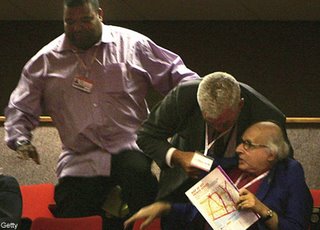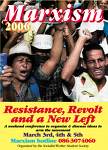
I've survived another
Marxism. With help and therapy I can look forward to
Marxism 2007 with hope and enthusiasm.
Of course some people have an unambiguously good time at
Marxism. Snowball at
Adventures in Historical Materialism has a good positive account. The treatment in
Socialist Worker is, of course, very positive, but I applaud the opening up of coverage. Rather than a single authoritative voice telling us how good it was, backed up by short snippets of interview, this year they've given the space to several positive but obviously fresh accounts. You can find more critical accounts in
Weekly Worker and
Solidarity (actually the AWL account is pleasantly honest and balanced
), but just as the SWP can come across as having pre-packaged views and conclusions, so can their critics.
Socialist Worker also gives a figure for attendance: 4,100. This is an interesting and positive development for transparency. Before it has always been bigger and better. I treasure the memory of an
SWP-blogger last year saying
Marxism 2005 was also bigger, but people just weren't necessarily in the meetings. Ah, bless. Last year's
Marxism took place in the immediate and disruptive wake of the horrors of 7/7, which must have held numbers down. And last year's
Marxism was also the first to be transformed into a long weekend, justified quite naturally by the previous weeks focus on Edinburgh and Gleneagles; however they seem to have decided this is a better format and soon it'll only be the experienced activists who'll remember the dark days of the Tuesday to Friday mornings. In 2004, what with the Respect campaigns in Leicester and Birmingham it was basically only the foreign comrades who gave the thing a semblance of life.
Back to numbers: 4,100. It seemed like roughly the same number as recent years, and that's quite a bit less than the numbers being claimed a few years back. It's harder to judge: the topography of
Marxism used to centre it on ULU and the Institute of Education, but it's a bit more dispersed now. The word was that there were unprecdented numbers of young people going: students and school students. Good, but if they've got more first-timers going, those of us not satisfied with the simple bigger and better message have got to ask what about the people who used to go. There's an obvious demographic effect. Despite the wonders of the creche and the obvious effort that the
SWP puts into providing this, there's going to be a demographic effect as comrades have children, etc. But there's still an issue: the
SWP puts a lot of emphasis on the new, the fresh faces, and very good and invigorating that is too, but political organisation needs to keep the older people with it. Yes, I'm disagreeing with Vladimir 'let the Liberals have the old people over 30' Lenin here. There certainly were old comrades who turned up, partly to meet old friends and comrades, partly to get a political boost; but I was certainly aware of the vast swathes of people who used to go, but no more.
It's interesting to compare
Marxism's 4,100 to both the Tolpuddle commemoration with around 10,000 people, but also the far fewer numbers that any other left organisation could muster for a long weekend of political discussion. Please remember this oh worthies of the
AWL, CPGB and others. Where but
Marxism would the promised introduction to
Battle of Algiers by the venerated Giles Pontecorvo be replaced by Saffron Burrows?
What was good about Marxism? Well, the range of non-
SWP speakers for one thing. Praise be to Danny 'I'm not in the
SWP, I don't shout' Dorling the geographer from Sheffield exposing mythss of segregation in Britain. Paul Gilroy was exceptionally cool in the forum on multiculturalism. The list goes on, imagine my despair at discovering Walden Bello had been replaced by Chris Harman! I missed Bernadette McAliskey, but everyone said how insprinig she was.
Of the non-
SWP speakers I think special praise should go to the various Islamic speakers. In the forum on 'Muslims and the left today' the
Respect Mayoral candidate in Newham, Abdurahman Jafar was cool and happening, and the other speakers Anas Al-tikriti and Nahella Ashraf (
Respect candidate in Manchester) were also excellent: fresh and honest, far away from tired old Marxist rhetoric and convincing in their claim to be part of the left, and that we are at the start of a dialogue and developing relationship. I know this is one of the most controversial issues, but to me its an application of then old principle about revolutionaries being tribunes of the people and that people can and do change in stuggle. Jafar was clear that the engagement with
Respect was the start of potential changes.
To continue being heretical I also enjoyed the 'What next for
Respect?' 'forum' (yes, okay, rally). Rees and Galloway both gave good rousing speeches, some overlap in their list of positive accomplishments (and I'm sure I was alone in thinking 'if Leicester was so brilliant in 2004, where's Leicester
Respect now?'). Both were good on the emphasis on the trade union conference called by
Respect in November and even Galloway's hope that Respect could replace Labour as the political voice for working people sounded convincing. Okay, long and difficult way to go, no guarantee of success and lots of reasons for cynicism about both Galloway and the
SWP, but good to have 'eyes on the prize'.
Other points: Joseph Choonara on Bolivia gave good background, but clearly wasn't interested in talking about practical solidarity. There seem to be a lot of 'revolutionarytourists' around: the wonders of globalization of course. On the other hand only one comrade made the call for a revolutionary party in Bolivia as necessary for success and that kind of stuck out as a sore thumb. Once upon a time it would have been said in every meeting.
Chris Harman on Cuba: really I went to see if the line had changed, with the firm assumption that if it had, Chris would have been in the rearguard. Well there is a distinct change of emphasis from the old days, a bit more emphasis on the positive and defence of Cuba against US imperialism, but the old underlying criticisms of 'socialism from above' remain - even if 'state capitalism' didn't get mentioned.
There's much more to be said, but let's jump to the downsides. The comrades trying to recruit you are still a pain. Weekly Worker recorded a figure of 121 joining , a bit down from previous years I think, but including two
Respect councillors from Tower Hamlets. Good, but how many willstill be members next year? I'm told a firm 'no' puts the recruiters off, but I'm not so sure myself. There's still too much arrogant egotism about the
SWP's view of itself. There's still too much triumphalism. There's still a bit too much of people saying the same thing. The rhetoric remains a bit too shallow, 'Neoliberalism' was a bit too much of a mantra. I couldn't face the opening and closing rallies: still expect the level of hysteria to be just too much. But I'd put all these things in the context of what is positive about the event, which remains by far and away the largst and most significant event of its type for the left in Britain.



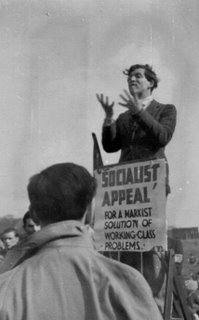





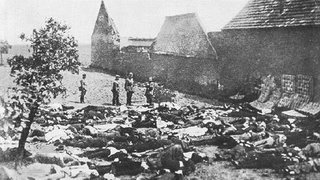
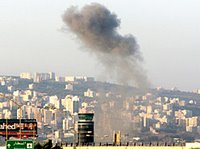






 So now we have decided to get a bit more professional, book a series of 6 films in advance, and we have produced 2000 glossy postcards to advertise them.
So now we have decided to get a bit more professional, book a series of 6 films in advance, and we have produced 2000 glossy postcards to advertise them.
